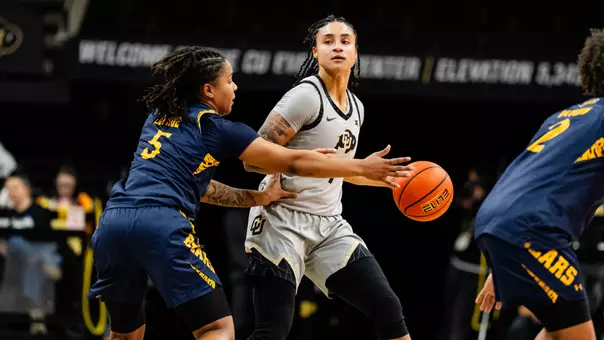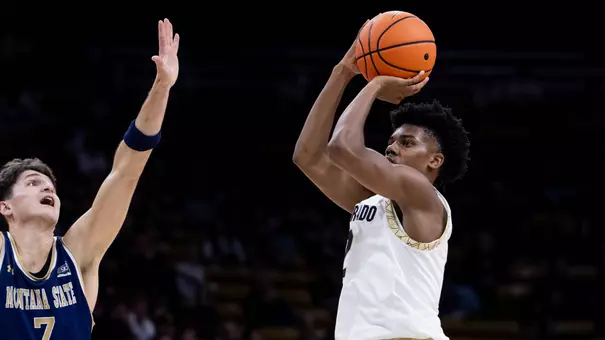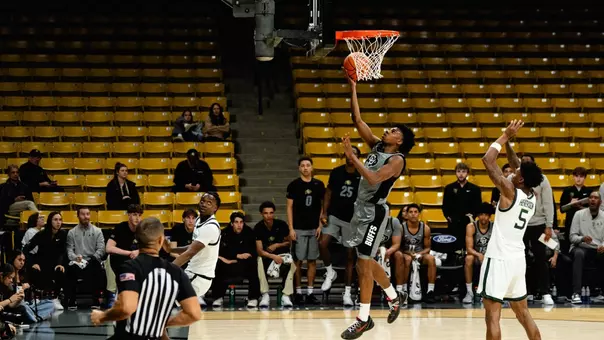Colorado University Athletics

Woelk: Ending Limit On Multi-Year Contracts A Strong, Positive Step For CU
February 09, 2018 | Football, General, Men's Basketball, Women's Basketball, Alumni C Club, Neill Woelk
BOULDER — It has been a long time coming — roughly 20 years — but the University of Colorado is back on a level playing field when it comes to the ability to offer multi-year contracts to its coaches and administrators.
It is hard to overstate the importance of such flexibility in today's world of college athletics.
Last year, thanks to some steady lobbying and educational efforts from Colorado athletic director Rick George, the Colorado state legislature removed its limit on the number of multi-year contracts a university can offer its employees. Thursday, George received approval from the CU Board of Regents for 20 contracts to a variety of coaches throughout the department in a number of sports. The regents gave near-unanimous approval and in one swoop, Colorado roughly quadrupled the number of coaches who now have the security and assurance offered by a contract.
"We go from a competitive disadvantage to being competitive and that's important," George said. "The support that we got from the regents and the chancellor (Phil DiStefano) to get this done is incredible. We're appreciative of that because it allows us to now be on a level playing field with our peers."
That playing field hasn't been level for more than two decades. Some quick history:
Up until the mid-1990s, universities in Colorado had no restrictions on the number of contracts they could offer. But the dismissal of a university president and ensuing buyout of the contract caught the attention of the legislature, and the result was lawmakers eliminating all multi-year contracts at universities.
That's right — all contracts. There was a time when Colorado was hiring head coaches, including a head football coach and head men's basketball coach, without the ability to offer a multi-year contract.
After such restrictions became an obvious impediment, the legislature relented — slightly —- and allowed universities to offer a handful of multi-year contracts. But the number wasn't even enough to cover all of a school's head coaches, never mind assistants.
Thus, as the practice of offering assistant coaches multi-year contracts as an incentive became more and more commonplace in college athletics, Colorado's universities — in particular CU and Colorado State — fell farther and farther behind in the competitive marketplace.
The result was other schools could easily "poach" CU assistants, and even head coaches in some sports, simply by offering the security of a multi-year contract.
But now those days are over. Colorado and CSU are back on a level playing field, making it easier to establish long-term continuity throughout their programs. While football is the highest-profile beneficiary, the truth is other sports will benefit just as much.
"Having that consistency and continuity at the top is invaluable," George said. "That was something we wanted to start with. You have people like (cross country and track coach) Mark Wetmore, (women's golf coach) Anne Kelly, coaches who have been here a while. We know they are committed to what we're doing, we know they have been successful, and we want to show our commitment to them. That's an important piece when you are talking about any organization. You need people to know that commitment goes both ways, and now we are able to show that."
With the latest move, most of the spotlight will be focused on football assistants, which is understandable. Football is the highest-profile sport at the vast majority of universities and is the economic engine for most athletic departments. It behooves every department to make sure football has every chance to succeed, simply because it is the foundation upon which most of the other sports are built.
Colorado has taken a major step in that direction, making sure CU's assistants have the assurance of more than an at-will agreement. Now, they are on the same plain as their peers.
But what the latest move also means is that CU's highly successful coaches in other sports — Wetmore, Kelly, volleyball coach Jesse Mahoney, women's lacrosse coach Ann Elliott, soccer coach Danny Sanchez, to name a few — also have the security of multi-year contracts. Meanwhile, the assistants who have helped them build their successful programs also have such security.
It means that recruits who sign with Colorado, in any sport, also have the assurance that those coaches who convinced them to come to CU have the support of the administration.
"When you are recruiting and then developing student-athletes, having that consistency and continuity with your programs is extremely important," George said. "You want everyone involved to know that you are committed to maintaining long-term excellence. That means student-athletes, their parents, our fans and boosters and all of our constituents."
Now, George said, CU has sent a signal that the department's commitment to student-athletes is being made at the highest level possible — and not just to one or two sports.
"I'm thrilled that we got great support from our regents and Chancellor DiStefano," George said. "It signals a commitment from the top down, and that sends a message to everyone involved that we are committed to that world-class experience for our student-athletes in every sport."
George deserves some major kudos for his work in this area. (Full disclosure: Rick George is my boss. Full disclosure Part II: He will not like me writing that he deserves accolades for his work.)
But George does deserve accolades because his goal since the day he took the job in Boulder has never changed: to make CU Athletics a fiscally responsible entity while producing a world-class experience for its student-athletes.
The addition of multi-year contracts achieves both of those goals. It means coaches who once worked on a year-to-year basis won't be so easily tempted to search for other opportunities that offer more stability. It also means coaches who help build successful programs won't be so easily lured to other schools.
(Remember this: when successful coaches are hired away, replacing them always costs more.)
"The industry standard is that your head coach and assistants and coordinators get contracts," George said. "Again, this puts us on the same competitive level as our peers and that's important. It was an important part of our the process. … To be able to keep your coaches and have that continuity from season to season, year to year is invaluable as you build your program."
It is a significant step forward, and all those involved — from the legislature to the regents to DiStefano to George — deserve credit for making it happen. Athletics are an important piece to a university puzzle, and the message has been sent that universities in Colorado won't be forced to play from behind.
That is a strong — and important — message to send, and the university, community and state will benefit as a result.
Contact: Neill.Woelk@Colorado.edu





